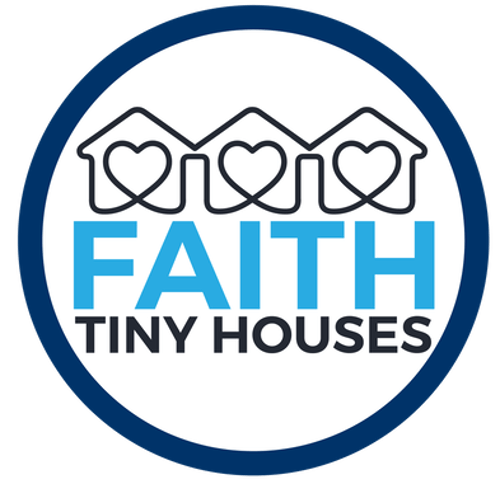Faith communities responding to homelessness.
The Faith Alliance Initiative for Tiny Houses (FAITH) is an organization of faith communities whose purpose is to encourage the development of tiny house solutions to homelessness in Olympia and the surrounding areas in partnership with each other and with the City of Olympia.
The members of FAITH are committed to explore the creation of tiny house facilities on their property or other property jointly managed by faith communities, other NGOs or the City. All faith communities in the Olympia area are invited to join the organization, attend FAITH meetings, explore the issues raised by tiny house communities and make use of the resources we have developed.
FAITH was founded on November 1, 2018 and grew to seven members and six associated faith communities by December 2018. We have created a Task Force to work with the City of Olympia to develop its pilot partnership program for faith communities and help identify the City requirements for tiny house facilities. We are also working to identify possible tiny house sites, and are planning to help with coordinating the construction of Tiny Houses. We are developing resources to support faith communities interested in tiny house projects.
Frequently Asked Questions
Why Do People Become Homeless?
Add The lack of affordable housing and insufficient income are significant contributors to homelessness. When a temporary financial or life crisis occurs, it can result in a person’s becoming homeless. The numbers of homeless follow the broad economic trends of the past decade: a rise during the recession, a drop during the economic recovery and a recent rise that correlates with sharp rent increases in Thurston County. (Source: Thurston County Homeless Census, 2018, p.5)an answer here.
What is the Status of Affordable Housing and its Effect on Homelessness?
Since the 1970s, the supply of low cost housing has shrunk significantly. Rents continue to rise and low income people have experienced slow or no wage growth. Today 6.7 million very low income households nationwide spend at least one half of their income on housing. They are at risk of losing their housing. The state of Washington is one of 8 states with 30 or fewer affordable and available rental homes per 100 extremely low income renter households. The median wage to afford a two bedroom apartment is approximately $21.21 while the federal minimum wage is $7.25 an hour. A minimum wage worker would have to work 122 hrs per week to afford a two bedroom apartment.
What Roles Do Substance Abuse and Mental Illness Have in Causing and Sustaining Homelessness?
Other factors that contribute to homelessness, or the inability to recover from homelessness, include physical and mental illness and substance abuse. The Substance Abuse and Mental Health Services Administration says that about 1 in 3 (35%) people experiencing homelessness suffer from substance abuse and about 1 in 4 (26%) suffer from mental illness. The chronically homeless (those who have been homeless for a year or more) are most likely to suffer from long term health issues such as mental illness, substance abuse, physical disabilities or other medical conditions. Substance abuse can be both a cause and a result of homelessness. It is important to also note that substance abuse and mental illness effect people in all socioeconomic groups.
Where Do the Homeless Find Refuge?
According to the 2018 Thurston County Homelessness Census, the homeless in our area found refuge in an emergency shelter (40%), transitional shelter (22%), out of doors (20%) and vehicles/RVs (17%). An example of emergency shelter is Union Gospel Mission. An example of transitional shelter is Plum Street Tiny House Village.
What Support Services are Available to the Homeless that Help them Address Underlying Issues and Find Stable Housing?
A combination of public municipal programs and resources, as well as not-for-profit and faith-based organizations provide a network of services for the homeless. The Thurston County Homeless Housing Program provides funding for non-profit organizations, local municipalities, for-profit developers and faith based organizations which can apply for this funding. Eligible activities include emergency shelters, overnight youth shelters, rental vouchers, furnishing of dwelling units, outreach services, services assisting persons leaving state institutions, and emergency eviction and prevention programs. The Washington State Department of Social and Health Services provides an array of programs to address financial, behavioral, rehabilitative, children’s and other needs that can help individuals and families. Among the many local organizations that assist persons from becoming or remaining homeless include the Salvation Army, Union Gospel Mission, Interfaith Works, SideWalk and City Gates. These organizations provide advocacy, financial, spiritual, counseling and recovery support to the homeless and those at risk of becoming homeless.
What Roles Do Law Enforcement and Substance Abuse Treatment Programs have in Addressing Homelessness?
The homeless population includes those engaged in substance abuse and/or involved in criminal activity. The police are most often the first to respond. Solutions to these issues include enforcement of existing laws and provision of treatment programs that are accessible to those with addictions. The City of Olympia Police Department Crisis Response Unit has the ability to provide outreach services to those in crisis, including the homeless. Given that the primary causes of homelessness are the lack of low cost housing and insufficient income, other societal issues must be addressed and resources brought to bear on the causes of homelessness.
